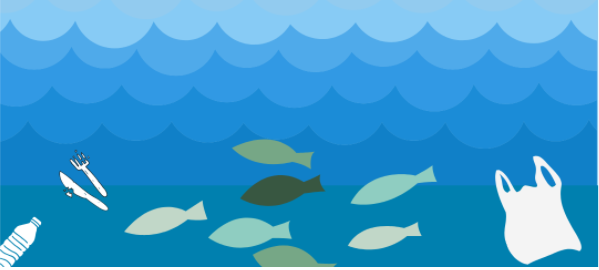Plastic has been mass-produced for seven decades and existed for just over a century; yet, the environmental effects it has left on our planet have been nothing short of detrimental. Plastic initially made important contributions to medicine, space travel, and the production of vehicles. As oil and gas companies discovered how easy it was to mass-produce plastics, the cost of production was kept low and their durable nature made it attractive for commercial and industrial usage. As a result, production has “increased exponentially, from 2.3 million tons in 1950 to 448 million tons by 2015… [and] is expected to double by 2050.” Today, the most popular use of plastic is single-use as they include items such as plastic bags, straws, coffee stirrers, soda, and water bottles, and most food packaging that are unrecyclable.
Because of their easy throw-away nature, approximately “8 million tons of plastic waste [are] escaping into the oceans” every year, even though it takes plastic at least 400 years to break down. Serving as a primary example, the Great Pacific garbage patch is a massive collection of marine debris composed of mostly non-biodegradable litter in the North Pacific Ocean. In addition, recent studies have shown that overfishing also poses a threat to our oceans as it has driven “some species toward extinction, irreparably changing ecosystems, harming millions of marine animals each year, and jeopardizing the well-being of people who depend on the ocean for food or work.” With commercial fishing occurring at a faster pace than sealife can replenish, the impact that bycatch – a term used to describe when an unwanted fish or other marine creature is caught during commercial fishing – and overfishing have on our oceans is becoming exceedingly devastating as well.
Released on the streaming service Netflix in March 2021, the documentary Seaspiracy serves to expose the fishing industry’s impact on the world’s oceans and advocates for ending fish consumption. Ali Tabrizi, the director of Seaspiracy, urges viewers to save ocean biodiversity by turning vegan. With such an extreme and controversial call-to-action, Seaspiracy may not actually be the best way to handle the issue that overfishing has posed to oceans and climate change. The documentary explicitly uses scare tactics to drive viewers away from the entire fishing industry by employing “questionable interviewing techniques, [using]anti-Asian tropes, and [blaming] the ocean conservation community.” However, not all statements made within the documentary are untrue. Seaspiracy claims that without sharks, the entire ocean ecosystem would eventually fail. The Food and Agricultural Organisation (FAO) of the UN found that “over 100 million sharks and shark-like fish are caught every year” with about 50% of all sharks being caught unintentionally as a ‘bycatch’ during the commercial fishery. Resultantly, sharks are at a significantly higher risk of being killed than humans are to be killed by a shark, with only 12 people dying per year due to a shark attack versus humans killing 11,000 to 30,000 sharks per hour.
It is crucial to understand the various ways in which we as humans have caused harm to the environment as a whole. Aside from the effects that mass commercial fishing has on climate change and ocean ecosystems, there is a vast list of how rising emissions affect the acceleration of climate change, including (but not limited to) the burning of fossil fuels, increased livestock farming, deforestation, the mass production and usage of plastics, deforestation, and so much more. As we focus on the effects of overfishing, wasteful fishing practices, and massive overconsumption of sea life, it is crucial to find solutions and implement key structural changes to address the issue of commercial fishing. As previously mentioned, bycatch occurs when unknowingly caught fish are returned to the sea because they weren’t the target fish. Rather than continue this method of scooping up fish using massive nets, otherwise known as trawling, countries and/or states should impose a ban on commercial fisheries and fishing vessels that use trawling methods to catch large quantities of fish. Another possible solution would be the introduction of catch shares, a term associated with “several fisheries management strategies that dedicate a secure share of fish to individual fishermen, cooperatives, or fishing communities for their exclusive use.” By implementing catch shares as a worldwide policy, sustainable fisheries can be secured, and established fishermen’s livelihoods can remain protected as mass commercial fishing cuts back.
Today, many advocacy groups and civil society networks are working towards implementing sustainable fishing practices and ending overfishing. Below you can find a few organizations that you, your friends, and your family can support as they move towards promoting more sustainable oceans:
- Natural Resources Defense Council (NRDC)
- Marine Conservation Institute
- Greenpeace International
- Canadian Wildlife Federation
- Environmental Defense Fund
- Sea Shepherd Conservation Society
Cover Art designed by GroundBreakers Network Engagement Fellow Gabrielle Garcia.
References:
- https://www.nationalgeographic.com/environment/article/plastic-pollution\
- https://www.worldwildlife.org/pages/plastic-is-not-the-biggest-problem-for-oceans
- https://www.vox.com/2021/4/13/22380637/seaspiracy-netflix-fact-check-fishing-ocean-plastic-veganism-vegetarianism
- https://web.archive.org/web/20060521181303/http://www.wildaid.org/index.asp?CID=3&PID=352&SUBID=&TERID=490
- https://www.fisheries.noaa.gov/insight/catch-shares#:~:text=Catch%20shares%20is%20a%20general%20term%20associated%20with%20several%20fisheries,communities%20for%20their%20exclusive%20use.&text=Catch%20shares%20are%20not%20required%20and%20are%20not%20appropriate%20for%20every%20fishery


